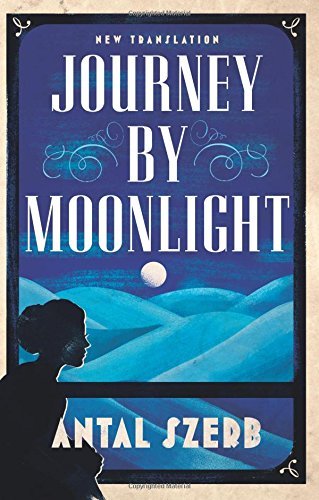Antal Szerb: Journey by Moonlight, transl. Peter V. Czipott, Alma Classics.
I’m late to this book, which everybody assured me I would love – and guess what, they were right! In fact, I loved this dreamy yet incisive look at nostalgia and romance so compelling, that I promptly ordered all of the other Antal Szerb books I could find in translation. His life was tragically cut short in a concentration camp in WW2, but he was quite a prolific author and literary historian, so there is lots to explore. With his Jewish heritage, widely travelled European sensibilities and beautiful prose, he reminds me a lot of my favourite Romanian writer, Mihail Sebastian, and has the same clear-eyed view of the charm but also the shortcomings of the Hungarian bourgeoisie and aristocracy that Miklos Banffy conveys so well in his Transylvanian Triology. But I am basing these comparisons on this book alone, and as far as I can see, his other books seem to be wildly different (a parody fantasy novel, a surrealist political novel, a historical novel etc.).
Mihaly and Erzsi are travelling through Italy on their honeymoon, but, although Mihaly prised his wife away from her first husband and might therefore be considered a happy man, he seems to prefer to wander off on his own, dwelling on the past, and his friendship with the sophisticated but strange siblings, Tamas and Eva. Tamas has died and Eva has disappeared, but he never loses hope of finding her again. While weltering in nostalgia, Mihaly misses the train to Rome that he and Erzsi were supposed to take together, but instead of jumping onto the next one, he seems to relish his freedom and embarks on a detour, meeting new people but also confronting his own past. Meanwhile, Erzsi starts questioning her choices too – obviously.
Mihaly is really rebelling against the expectations of his family and society, that he should take over the family business (which he has no interest in). His marriage was his last attempt to fit into the conventional bourgeois lifestyle, while for Erzsi it was the elopement with him that was the act of rebellion. With such mismatched expectations for their union, it is not surprising that they drift apart. Mihaly is lost in reflective nostalgia, as opposed to restorative nostalgia. As the translator points out in his afterword, restorative nostalgia is all about coming back home or reconstructing the lost home, while Mihaly thrives in the longing itself and delays the homecoming, for fear it might not match up to his memories.
For so many years I did everything to conform, and when I thought that at last everything was in order and I’d finally made my peace with the world, then I married you to reward myself. And that’s when all the demons assailed me: my entire youth and all the nostalgia and all the rebellion. There’s no medicine for nostalgia. Perhaps I should never have allowed myself to come to Italy. They built this land out of the nostalgia of kings and poets. […]
The world doesn’t allow a man to give himself over to nostalgia… it doesn’t tolerate any deviation from the norm, any escape and defiance…
This melancholy musing is of course right up my street, but the book is full of humour too. Mihaly is often very observant and funny about the countries he has been in, for example when he says that ‘November in London isn’t even a month, but a spiritual condition’. He encounters the spirited, good-natured but vacuous American girl, Millicent, and that leads to some humorous exchanges.
The book is of course full of local atmosphere of Italy: the colours, smells, sounds and sights which Szerb clearly adored and also wrote about in a diary of a trip to Italy. His protagonist Mihaly is initially more ambiguous about Italy, a place he avoided visiting. And now that he is there, he loves the country but can be quite critical about the Italians, and much of what he says sounds chilling and prophetic in 1937, not just for that country:
His instincts told him that, in Italy, the identity of those who wielded power – and the principles in the name of which they ruled the people – didn’t matter at all. Politics only touched on the surface; the people – the vast, vegetative Italian people – bore the changing times on their backs with amazing passivity, and they didn’t acknowledge having anything to do with their magnificent history.
This was probably my favourite of the books that I read for the #1937Club, and that includes Virginia Woolf’s The Years, which is saying something, since she is one of my favourite authors (although The Years is not my favourite of her books).
There is another translation of this book by Len Rix, who is also the translator of Oliver VII, both published by Pushkin Press. I cannot pronounce myself on that translation, but I really enjoyed this one, which has the dreaminess but also a certain world-weariness that I can imagine might have overcome many European authors in the second half of the 1930s. I should also add that there is a further translation by Peter Hargitai, which was the first of them all, and that there is quite some controversy surrounding the Len Rix translation, which Hargitai claims is plagiarised. You can catch a glimpse of this in the comments to the excellent review post by Max Cairnduff. Other reviews of this book, which each emphasise a slightly different aspect than I do (so you should read them all): Emma from BookAround, Simon from Tredynas Days, Karen from Kaggsy’s Bookish Ramblings and Tony Malone.


I just looked at my post on this: I liked the wry humour, but was less keen on the overall effect.
I wonder if a different translation might account for the different reaction (but of course, mood and time also matters). But I do tend to be very susceptible to that Central European schizophrenia between bourgeoisie and rebelliong, and nostalgia for things that can never be recaptured (and possibly never existed in the first place).
I’ve read this for the 1937 Club too! But a different translation – I’ll post later this week. Really wonderful review Marina Sofia and such an interesting point about being a European author at this time.
I gather there’s a controversy about some of the translations, and I had no idea there were three different ones in existence. I wonder how they colour our perception of the book.
Last things first – thanks for the links to the other reviews! Looking forward to reading them. And now, your own: you’ve really captured much of what I felt about this, which (unaware of any controversy) I read in the Len Rix translation, as with the other Szerb titles I’ve read.
And I’m glad you picked out the passage about no remedy for nostalgia as that’s the keynote I chose for my review scheduled for a couple of days hence!
I hope you do go on to read his other titles published by Pushkin Press, at least for the range of genres he tackles which you’ve already noted. Apart from acquiring a collection of his short stories I’ve got his history nonfiction The Queen’s Necklace to read when the mood takes me, maybe for Nonfiction November; I’m interested to see what he makes of that.
I have a real soft spot for books like this that show a place through the eyes of a visitor. I think they offer a really interesting perspective, and in this case, not just on the place, but on the times.
There’s also melancholy musing in The Third Tower, Journeys in Italy (1936), by Antal Szerb, translated by Len Rix.
Did you buy that one?
(Kaggsy reviewed it too.)
If I had time, I’d have read this book (Pushkin/Rix version) as well as the Ambler I plumped for first for #1937Club, but it’s not going to happen this week! I hadn’t seen the debate in Max’s comments! Fascinating and worrying – surely there will be times when translators come up with the same phrases as the obvious choice used previously, thereby risking plagiarism charges. Most mistranslations will be missed by the non-speaker of a language too.
Would love to read more writers from this region. Charming thoughtful review!
Such an interesting review, and I had no idea about the translation controversy. I read and loved the Len Rix version and I’ll have to check out what’s said about it. I’m very fond of Szerb generally, having read more than one – and I do have some of his work unread too, which is good!
Great review and thank you for alerting me to this author. I now have the title reviewed. Also you reminded me of how much I had enjoyed Miklos Banffy discover when reading Patrick Leigh Fermor. I really must explore writing from those parts of the world more thoroughly.
Oh wow, I just published my post, and this is one of my 3 books:
https://wordsandpeace.com/2024/04/17/book-reviews-for-the-1937-club/
I read this some years ago (pre-blog), and while the dreamy nostalgic atmosphere has stayed with me, much of the detail has slipped since then. I’m so glad to see that you enjoyed it, too!
Wow, I love it when a book is such a success that you instantly need everything else! This has been one of the most-reviewed club books, and it’s definitely got me keen to read it.
If you enjoyed the nostalgia of this one, you should definitely read Gyula Krúdy.